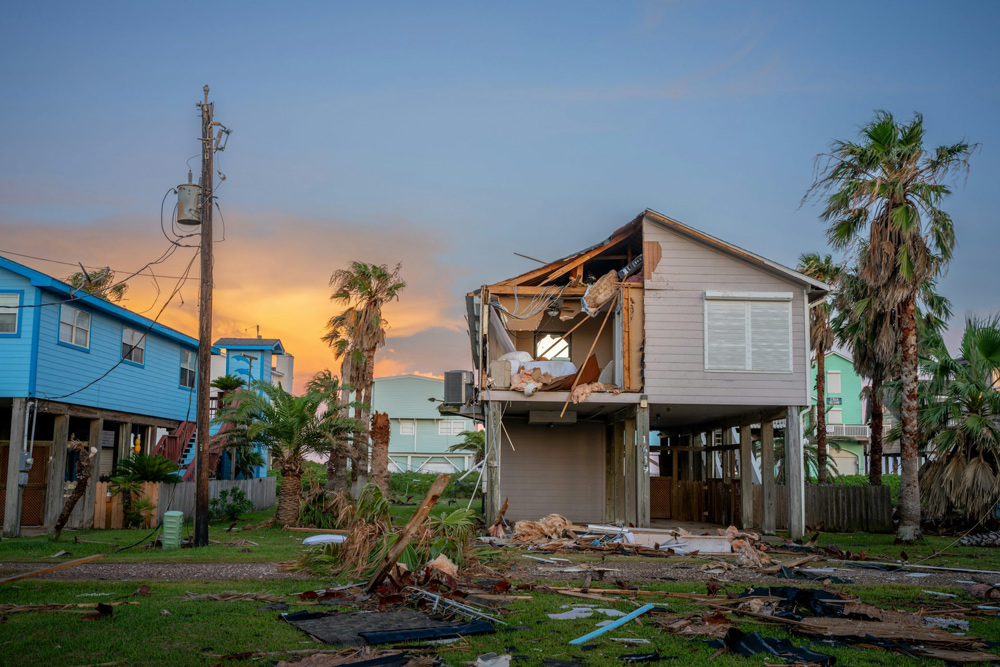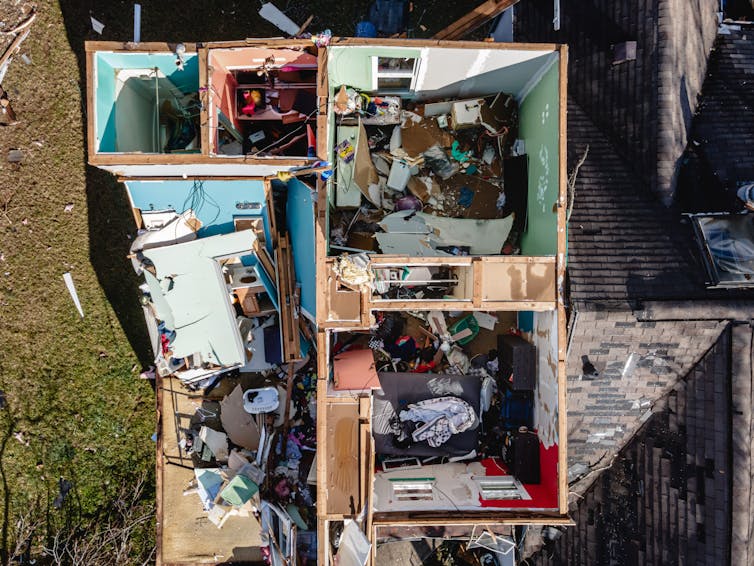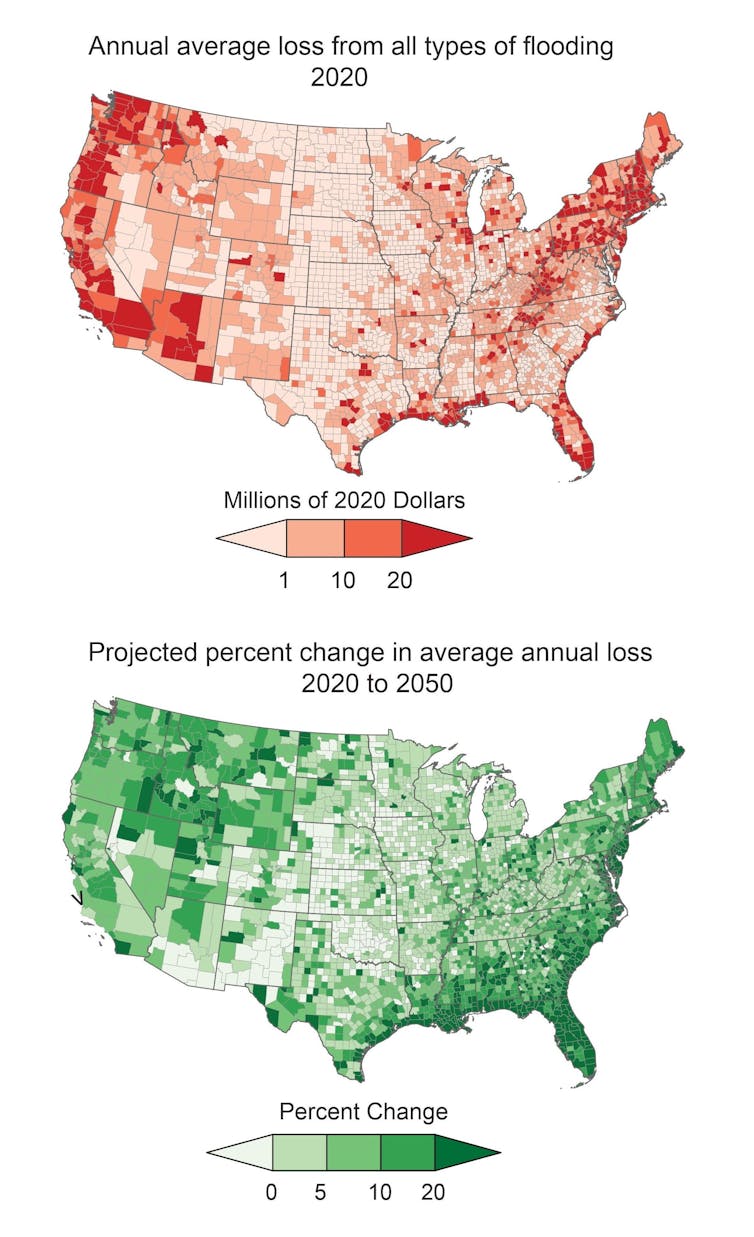
By Andrew J. Hoffman
Home insurance rates are rising in the United States, not only in Florida, which saw tens of billions of dollars in losses from hurricanes Helene and Milton, but across the country.
According to S&P Global Market Intelligence, homeowners insurance increased an average of 11.3% nationwide in 2023, with some states, including Texas, Arizona and Utah, seeing nearly double that increase. Some analysts predict an average increase of about 6% in 2024.
These increases are driven by a potent mix of rising insurance payouts coupled with rising costs of construction as people build increasingly expensive homes and other assets in harm’s way.
When home insurance averages $2,377 a year nationally, and $11,000 per year in Florida, this is a blow to many people. Despite these rising rates, Jacques de Vaucleroy, chairman of the board of reinsurance giant Swiss Re, believes U.S. insurance is still priced too low to fully cover the risks.
It isn’t just that premiums are changing. Insurers now often reduce coverage limits, cap payouts, increase deductibles and impose new conditions or even exclusions on some common perils, such as protection for wind, hail or water damage. Some require certain preventive measures or apply risk-based pricing – charging more for homes in flood plains, wildfire-prone zones, or coastal areas at risk of hurricanes.
Homeowners watching their prices rise faster than inflation might think something sinister is at play. Insurance companies are facing rapidly evolving risks, however, and trying to price their policies low enough to remain competitive but high enough to cover future payouts and remain solvent in a stormier climate. This is not an easy task. In 2021 and 2022, seven property insurers filed for bankruptcy in Florida alone. In 2023, insurers lost money on homeowners coverage in 18 states.
But these changes are raising alarm bells. Some industry insiders worry that insurance may be losing its relevance and value – real or perceived – for policyholders as coverage shrinks, premiums rise and exclusions increase.
How insurers assess risk
Insurance companies use complex models to estimate the likelihood of current risks based on past events. They aggregate historical data – such as event frequency, scale, losses and contributing factors – to calculate price and coverage.
However, the increase in disasters makes the past an unreliable measure. What was once considered a 100-year event may now be better understood as a 30- or 50-year event in some locations.
What many people do not realize is that the rise of so-called “secondary perils” – an insurance industry term for floods, hailstorms, strong winds, lightning strikes, tornadoes and wildfires that generate small to mid-size damage – is becoming the main driver of the insurability challenge, particularly as these events become more intense, frequent and cumulative, eroding insurers’ profitability over time.

Jon Cherry/Getty Images
Climate change plays a role in these rising risks. As the climate warms, air can hold more moisture – about 7% more with every degree Celsius of warming. That leads to stronger downpours, more thunderstorms, larger hail events and a higher risk of flooding in some regions. The U.S. was on average 1.5 degrees Celsius (2.6 degrees Fahrenheit) warmer in 2022 than in 1970.
Insurance companies are revising their models to keep up with these changes, much as they did when smoking-related illnesses became a significant cost burden in life and health insurance. Some companies use climate modeling to augment their standard actuarial risk modeling. But some states have been hesitant to allow climate modeling, which can leave companies systematically underrepresenting the risks they face.
Each company develops its own assessment and geographic strategy to reach a different conclusion. For example, Progressive Insurance has raised its homeowner rates by 55% between 2018 and 2023, while State Farm has raised them only 13.7%.
While a homeowner who chooses to make home improvements, such as installing a luxury kitchen, can expect an increase in premiums to account for the added replacement value, this effect is typically small and predictable. Generally, the more substantial premium hikes are due to the ever-increasing risk of severe weather and natural disasters.
Insurance for insurers
When risks become too unpredictable or volatile, insurers can turn to reinsurance for help.
Reinsurance companies are essentially insurance companies that insure insurance companies. But in recent years, reinsurers have recognized that their risk models are also no longer accurate and have raised their rates accordingly. Property reinsurance alone increased by 35% in 2023.
Reinsurance is also not very well suited to covering secondary perils. The traditional reinsurance model is focused on large, rare catastrophes, such as devastating hurricanes and earthquakes.

Fifth National Climate Assessment
As an alternative, some insurers are moving toward parametric insurance, which provides a predefined payment if an event meets or exceeds a predefined intensity threshold. These policies are less expensive for consumers because the payouts are capped and cover events such as a magnitude 7 earthquake, excessive rain within a 24-hour period or a Category 3 hurricane in a defined geographical area. The limits allow insurers to provide a less expensive form of insurance that is less likely to severely disrupt their finances.
Protecting the consumer
Of course, insurers don’t operate in an entirely free market. State insurance regulators evaluate insurance companies’ proposals to raise rates and either approve or deny them.
The insurance industry in North Carolina, for example, where Hurricane Helene caused catastrophic damage, is arguing for a homeowner premium increase of more than 42% on average, ranging from 4% in parts of the mountains to 99% in some waterfront areas.
If a rate increase is denied, it could force an insurer to simply withdraw from certain market sectors, cancel existing policies or refuse to write new ones when their “loss ratio” – the ratio of claims paid to premiums collected – becomes too high for too long.
Since 2022, seven of the top 12 insurance carriers have either cut existing homeowners policies or stopped selling new ones in the wildfire-prone California homeowner market, and an equal number have pulled back from the Florida market due to the increasing cost of hurricanes.
To stem this tide, California is reforming its regulations to speed up the rate increase approval process and allow insurers to make their case using climate models to judge wildfire risk more accurately.
Florida has instituted regulatory reforms that have reduced litigation and associated costs and has removed 400,000 policies from the state-run insurance program. As a result, eight insurance carriers have entered the market there since 2022.
Looking ahead
Solutions to the mounting insurance crisis also involve how and where people build. Building codes can require more resilient homes, akin to how fire safety standards increased the effectiveness of insurance many decades ago.
By one estimate, investing $3.5 billion in making the two-thirds of U.S. homes not currently up to code more resilient to storms could save insurers as much as $37 billion by 2030.
In the end, if affordability and relevance of insurance continue to degrade, real estate prices will start to decline in exposed locations. This will be the most tangible sign that climate change is driving an insurability crisis that disrupts wider financial stability.
![]()
Andrew J. Hoffman is Holcim (US) Professor of Sustainable Enterprise at the Ross School of Business, School for Environment & Sustainability, at the University of Michigan. Justin D’Atri, Climate Coach at the education platform Adaptify U and Sustainability Transformation Lead at Zurich Insurance Group, contributed to this article.





























Doug says
I am thoroughly disgusted with the insurance industry. Last month, I received a request from Frontline Insurance Company with a list of items they needed to renew my homeowners insurance policy. It took me about an hour to photograph and submit what they needed. That’s an hour out of MY DAY to do THEIR JOB, then pay the high premiums. Nevertheless, I was surprised that no representative from Frontline came to my house for an inspection. Today, I received a notice from Frontline stating, “Toilet supply line found in below average condition. Replacement is required to prevent premature failure.” This indicates that Frontline has failed to provide the service I expect. Had they sent an inspector out to do THEIR JOB, they would know that I remodeled this bathroom 5 years ago, everything is new, and it’s a stainless steel braided supply line. Furthermore, they would have known that this bathroom was in the garage, and I kept the garage door open during the day for house access. With that, they would know that my area has a high salt air content due to the ocean’s proximity and the river behind me.
This has nothing to do with the price of a toilet supply line and replacing it. Still, some lazy, overpaid Frontline employee who probably has never left their office chair made this decision based upon a photograph, which irritates me beyond belief. It’s unfair that our insurance premiums keep rising while the insurance companies do less and routinely deny claims, forcing customers to hire lawyers to mediate on our behalf. The insurance industry is a big racket filled with corporate greed and people who have zero experience.
Not Important says
A lot of insurance companies are now using AI to review photos and process inspections. I had this happen to me and a lot of items that it said needed fixed – did not. It was easiesr for me to just switch insurance companies than reply to them and fight it.
Joe D says
Security First (Geico’s name in Florida) refused to renew my Flagler Beach property, because I couldn’t “prove” my roof was less than 10 years old.
My property is poured concrete with cabling (not rebar), so it “gives” in high winds. The townhouse is constructed with concrete slab floors, and concrete slab roof with insulated foam. The housing development has NEVER had significant damage from winds or flooding (the home is elevated 8 ft off the ground …which is already 12 feet above sea level).
I could find no Flagler Beach records of any required permit for roof replacement. Technically the roof design “NEVER” needs replacement.
I tried another company, and although I found coverage, it was still double my prior policy at $4000!
I found another insurance group, who had an inspector come out ($275 cost)..who reviewed the property, and the only issue was the toilet and clothes washer water supply lines. $250 to upgrade the lines. I got several wind mitigation and structural discounts, and a policy amount of $2400 ( only a $400 increase over my original policy). My inspection and discounts can continue for 5 years without having to redo. Of course the hurricane deductible remains $5000, as did the old Safety First policy.
I spent years looking for an ELEVATED sturdy property to purchase for my retirement, despite my real estate agent telling me he could find me multiple (cheaper) townhomes (all on the ground). No….I didn’t want my property floor prone, thank you!
The storm danger is not getting any less…so I can anticipate this insurance nightmare will continue. I was just used to the 8-10ft elevation off the ground required of all coastal construction since the mid 1980’s in my prior home state of Maryland. I wondered when I arrived in Flagler Beach, why I didn’t find many elevated properties…even those built in the last 10-15 years.
Laurel says
Joe D: We see the bubble beginning to burst, here in Florida. Half a million people left the state last year, the most in history. Meanwhile, developers are still trying to out build the state with houses on the ground, made of pressed wood and slimmer timber. Look to Bunnell and Flagler Beach. I am wondering who is going to buy these matchstick homes in flood prone areas, and pay the increase in taxes and insurance requirements?
In Charleston, SC, the marshes are being filled in to produce more *buildable* land. The developers develop, planners support, the commissions approve, people buy and get stuck with insurmountable problems, while the real estate people walk away.
When we first came up here, from south Florida, we couldn’t believe that the houses had no hurricane shutters! This was before hurricane windows were required. Things change, as does the climate.
Atwp says
Should an overpaid homeowners insurance ceo get killed before we can see some the wrong things they are doing to people. Perhaps we need to ban voting for Republicans, probably life will be a little better for the little working people.
Whathehck? says
Why does Palm Coast and Flagler County approved stick built houses and apartments being built by the 1000?
I wouldn’t live in the flimsy built military barracks north of Belle Terre Elementary school.
Denali says
Please explain what makes your tract house with its non-reinforced CMU walls, ‘stick-built’ roof with no load path and mediocre doors and windows so much better than these wood framed houses with continuous load paths, interior shear walls, impact resistant windows and doors, high wind rated garage doors and 150 mph shingles? Having sat on the ASCE 7 code writing panel for decades I would like to know what we are doing wrong, in your learned opinion.
Joe D says
For Denali:
One question I have about the storm resistant construction rules….
I came from Maryland, and since the mid 1980’s all new coastal construction had to be 8-10’ above the ground (stilts/concrete wall/concrete piers), except for garage areas, storage areas and recreational areas.
As mentioned in my earlier post, when I looked for similar ELEVATED homes in Flagler Beach, I could only find a VERY limited few which were elevated ( even with close proximity to the beach or intracoastal waterway). I refused to even look at a non-elevated property, despite my agent telling me he could show me “much cheaper” townhomes other than the beach facing development I wanted (built in 1979!!)…elevated 8’ off the ground with poured concrete walls, cabling and concrete slab floors and roofs. Many owners have added hurricane shutters or high impact windows over the years.
Since 1979, there have been (to my knowledge) no major damage, no flooding and only minimal wind damage to any of the homes in my development! These homes were clearly of a design way before their time. But it appears no one has chosen to duplicate the design elsewhere in Flagler County? Having this structural design dropped my insurance coverage from $4000 to $2200 due to the wind mitigation and structural protections the design afforded me. And other than losing my HVAC rooftop hurricane cover in 2022, I have had no other storm “damage.”
Would it
Make sense, in weather and water flood prone areas to require new homes in a similar way? I’m not talking about mounding up an additional 3 ft of ground then building directly on that ( with the resulting runoff affecting older neighboring properties).
Of course the design of my development made it more INITIALLY expensive (hint…probably the reason).
john says
People pay for years into homeowners insurance, and medical insurance for years and then God forbid you have a mishap and put in a claim and right away they either refuse to cover you or they drop you.
It is ok that for years that took tour premium without one thought.
It is time Washington does something about them basically stealing our money for years and then not covering claims.
Oh, I forgot Washington isn’t there to help the American people they are just there to fill their own pockets with money like in insurance companies.
Tony Mack says
What other “civilized” countries pay for home insurance…
Home insurance in Germany?
The cost of home content insurance in Germany depends on the value of the contents you’re insuring and the level of coverage you choose. On average, premiums can range from €50 to €300 per year. (About $310)
Cost to insure a house in France?
Generally, yearly premiums start at around €100–150 but can cost €500 ($520) or more for expensive properties.
House insurance in England?
Home insurance price differences across property types
UK Property Type Average Annual Home Insurance Cost Q1 2023 Average Annual Home Insurance Cost Q1 2024
Detached £270.67 ($339) £394.86 ($494)
Semi-Detached £180.5 5 £255.09
Terraced £166.91 £227.88
Apartment £66.39 £80.39
Joe D says
Question?
Are the insurance policies in other countries including “liability” coverages for getting sued? What are the deductible levels for those coverages? Are we comparing prices of “apples to apples,” as they say? I would be interested in knowing.